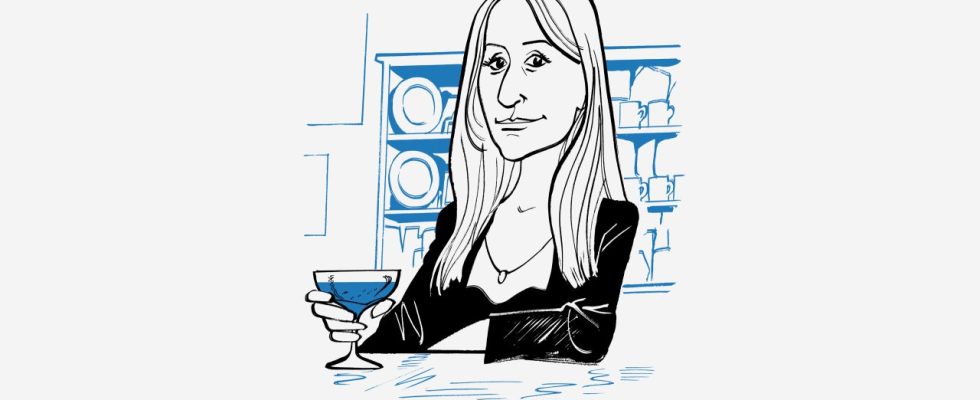The singer-songwriter Margo Price took a seat the other day in Hekate, a non-alcoholic dive bar, and ordered a drink. The bar, on Avenue B, was empty except for the bartender and a tarot-card reader, who was waiting for a customer to show up. (Hekate is the goddess of witchcraft in Greek mythology.)
“This is what I’ve been looking for!” Price declared, admiring the tiered array of festive colored bottles of alcohol-free “liquor” arranged against a wall of mirrors.
“Hell, yeah!” the young man with long hair who was tending bar exclaimed.
Price, whose most recent album, “Strays,” is her strongest solo work yet, wore a black skirt and a crop top, her long coppery-blond hair covering her tanned shoulders. “Something to remind me of the good old days!” she said, taking an appreciative sip of a “whiskey sour” made with a “bourbon alternative” that had a spicy botanical taste. “But I don’t have to drink seven of these and throw up the next day.”
“Rock on!” the bartender cried.
Price, forty, quit drinking two and a half years ago. Before that, as a female country artist who struggled for years to make it in Nashville, she played a familiar role. “I was the fun party girl,” she said. “I was the party. I’d be bringing the shots, so that everyone could have a great time. My identity was so wrapped up in that, and I didn’t want to lose it.” Whiskey soaked her work, too: one of Price’s top tracks on Spotify is “Hurtin’ (On the Bottle)”:
During the pandemic, her drinking “ramped up,” she said. In the evenings, after putting her two children to bed, she’d start boozing with the band, which includes her husband, Jeremy Ivey, who plays guitar. “I’d shoot tequila and drink twelve White Claws to keep up with the guys,” she said. With no shows to play, “I felt so purposeless. I felt like my career was over, and it really scared me.”
One night, Price macrodosed psilocybin. She had been reading about how Bill Wilson, a co-founder of Alcoholics Anonymous, had taken belladonna, a psychedelic, which supposedly led to the creation of the program. “And I thought, Wow, that is so interesting.” While tripping, she had a revelation: “No one is going to care if I quit.” She hasn’t swallowed any alcohol since.
At first, “there was definitely a lot of shame,” she went on. “I had this idea of people who were sober. Like, they’re the damaged ones. I didn’t want to admit that I’m the person who’s got the disease.” For months, she kept her sobriety from the band. When they drank, she was careful to covertly refill her glass with non-alcoholic beer in the kitchen. She became adept at shooting “fake shots” of soda water: “I didn’t want them to feel weird and not to hang out with me.”
During the recording of “Strays,” most of which took place at the Topanga Canyon home studio of the producer Jonathan Wilson, Price was nearly outed. Wilson has an old cantina-like bar with Western décor—antlers and old leather—in a freestanding building on his property. During their sessions, Price appointed herself bartender. “I felt like I could control things if I was bartending,” she said. “So, when everyone would do a shot, I would do soda water.”
But after one session someone else poured the tequila shots, in plastic glasses. “It had been over a year at this point,” Price said. “And I was very dedicated to my sobriety. But I had a moment of weakness and thought, What’s one shot going to do? So I took one and looked down, and the plastic glass had a crack in the bottom. All of the tequila leaked out.” When the session ended, she shared her secret.
“I feel like I’ve aged in reverse,” she said, of the previous couple of years. “I have all this energy now, my dreams are so good, and I lose weight effortlessly. I can even eat bread!” As for her husband and bandmates, “I still get them their beers.” In the mornings, when she would formerly have been nursing a hangover, she used the time to write a memoir, “Maybe We’ll Make It,” which was published last October, by the University of Texas Press. It details her long years of rejection in Nashville before Jack White’s label, Third Man Records, put out “Midwest Farmer’s Daughter,” her breakthrough album, in 2016. Earlier in the day, Price had met some producers about making a documentary based on her book.
Leaving Hekate, Price passed the tarot-card reader, now seated across from a client at the window. Three cards were showing. One was the World. ♦

